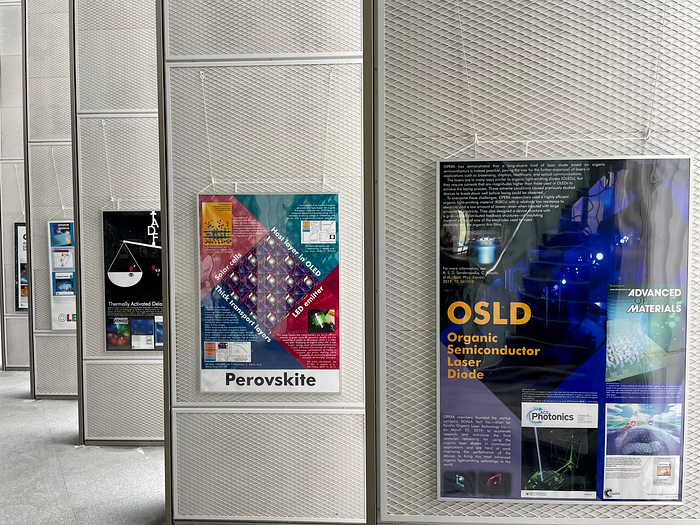Why We Invested in Koala Tech Inc.
Beyond OLED — Organic Semiconductor Laser Diode (OSLD) technologies for next-generation displays, optical sensing, biometrics and more.
Two years ago, we were introduced to Prof. Chihaya Adachi, Dr. Fatima Bencheikh, Takao Hayama, and their colleagues who had recently founded Koala Tech Inc., short for Kyushu OrgAnic Laser Technology. Their aim was to further develop and commercialize a long-elusive kind of optoelectronic device based on organic semiconductor laser diode (OSLD) technology. This technology had recently had its practical viability demonstrated — as a world first — by Prof. Adachi’s research group at Kyushu University in Japan. As an innovative platform technology organic semiconductor laser diodes will have a transformative impact in telecommunications, medical diagnostics, and display technologies, with potential for far surpassing the capabilities of existing organic light-emitting diodes (OLED) technology.

In our many conversations, the Koala Tech team — later bolstered by the addition of CFO Shinobu Ito, R&D Manager Yoko Fukunaga and R&D Leader Morgan Auffray — built a convincing case for the promise of OSLDs in a wide range of applications. With their strong credentials and promising results, the team is probably the best positioned in the world to bring OSLD technology from the lab to the market. OSLDs represent a foundational technology set to expand the application of lasers in fields ranging from displays and healthcare to biometrics, augmented and/or virtual reality, and much more.

Our recent investment in Koala Tech marks our first enterprise outside of Europe or North America and aligns with Propagator Ventures’ strategy to support the foremost technologies and teams in the world. Notably, we became Koala Tech’s first investor from outside Japan. We have joined existing notable Japanese investors, including Sony Group Corporation and Beyond Next Ventures (BNV), in a financing round concluded this summer.

Rooted in Pioneering Efforts
This investment is rooted in the pioneering efforts of the Adachi and Nakanotani Laboratory at the Center for Organic Photonics and Electronics Research (OPERA) at Kyushu University in Japan, a global leader in the field of organic electronics. Prof. Chihaya Adachi is arguably one of the world’s foremost authorities on organic electronics devices and a leading innovator and pioneer whose work is considered as fundamental to the advancement of OLED technologies.

Understanding OSLD: A Post-OLED Technology?
Organic laser diodes, which use carbon-based organic materials to emit laser light, pave a promising pathway to applications unattainable by their inorganic counterparts used in traditional devices. OSLDs hold potential for being more cost-effective and adaptable compared to existing inorganic laser diodes. They also facilitate the development of novel optoelectronic devices that surpass many current OLED-based solutions.
Advantages and Applications of OSLD
OSLD can hold promise in developing high-resolution display technologies and advanced medical devices, potentially revolutionizing diagnostic and treatment methodologies, biometrics, smart displays, optical sensing, and more. The technology can also open new avenues in spectroscopy, offering a platform for more efficient and precise analytical techniques.

OSLDs are comparable to organic light-emitting diodes (OLEDs), which are ubiquitous in digital displays across various devices. Like OLEDs, organic laser diodes are constructed by sandwiching a thin film of organic material between an anode and a cathode, emitting light when electricity is applied.

A primary distinction between OSLDs and OLEDs is that OSLDs emit coherent laser light — or “pure light” of a given and tunable wavelength, phase and color — whereas OLEDs emit incoherent light that does not oscillate at the same frequency or phase. This fundamental difference in light characteristics opens the door for OSLDs to have applications that OLEDs cannot cater to. Here are some reasons and applications where OSLDs have an edge:
Coherence
Because OSLDs emit coherent light, they can be used in applications that require precision and specificity, such as in interferometry, holography, and high-resolution microscopy.
Directionality
Laser light, due to its coherence and typical mode structure, can be highly directional. This makes OSLDs suitable for applications that require directed beams, like optical communication, and low-level laser therapy.
Data Transmission
Because of their directionality and narrow spectral output, lasers are preferred in communication systems. OSLDs could find a role in optical data transmission, offering potentially high integration density systems.
Spectral Purity
The spectral output of lasers can be much narrower than that of typical incoherent light sources. This makes OSLDs suitable for applications where specific wavelengths or narrow bands of wavelengths are necessary, like in some chemical or biological sensing technologies.
Biomedical Applications:
Coherent light sources like OSLDs can be used in medical treatments requiring precision, such as targeted photodynamic therapy, laser eye surgeries, or tissue ablation. While OLEDs have their own array of impressive applications, especially in the realm of displays and lighting, their incoherent light output means they are not suitable for the aforementioned applications where the unique properties of lasers (like coherence, directionality, and spectral purity) are indispensable.

Overcoming Challenges and Pioneering Advancements in OSLD Technology
However, realizing the full potential of OSLD technology relies on overcoming challenges that include achieving the necessary lasing process under high current conditions, which causes most organic materials to heat up and break down due to electrical resistance when electricity is injected, limiting their lifetime.
In 2019, Prof. Adachi’s research group demonstrated the viability of organic semiconductor laser diodes, paving the way for novel laser technologies. This breakthrough addressed a fundamental materials science problem, revolving around the identification and optimization of organic compounds capable of producing laser light under electrical excitation.
Koala Tech: Leading the Way in OSLD Innovation

Koala Tech was established to pioneer and commercialize the world’s first organic semiconductor laser diode, making significant R&D advances in materials, device engineering, and photonics to create structures that support the efficient operation of organic materials in a laser diode setup.
The company has built a strong patent portfolio, proposed new manufacturing and product applications, and forged partnerships with several world-leading, critical industry players on the road to device commercialization. Benefiting significantly from its proximity to the state-of-the-art laboratory and technical infrastructure at the neighboring Kyushu University Ito campus, the international team in Fukuoka continues to collaborate closely with world-leading global research centers for organic optical devices.
We are excited to back the international Koala team, led by Algerian born Dr. Fatima Bencheikh, as they work to realize the transformative potential of OSLD technologies, set to become a platform for a range of new applications and devices with vast commercial potential.
